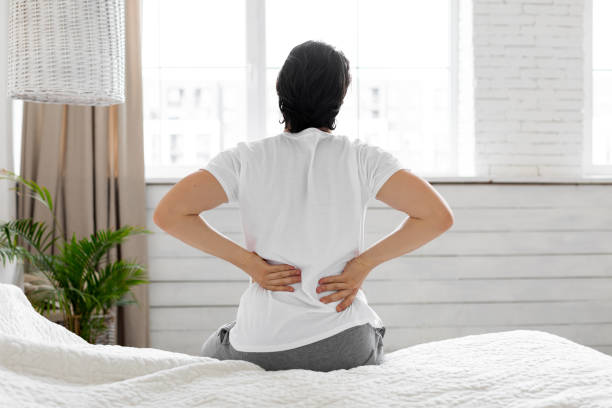Pain in your upper back after sleep is a common problem that can disrupt your day. It can also be a sign of a serious medical condition.
What causes back pain when you are sleeping or lying down? It may be a result of muscle imbalances, underlying spinal conditions, or stress and tension.

Poor Sleep Posture
A bad sleep posture can cause your back and neck to ache when you wake up. This is because the muscles and tendons in your neck and back are overworked when they shouldn’t be as they slumber through the night. The best position to sleep in is on your back as it straightens the spine and evenly distributes weight. If you are unable to sleep in this position, it is important to make sure your pillow supports your head so that it remains in alignment with the rest of the spine and that there is a pillow between your legs to prevent one leg from stretching over the other which can tilt the pelvis.
Slouching while you slumber spells disaster for your spinal cord, upper and lower back, and rotator cuff tendons. If you do this regularly, it can result in long-term stiffness and pain.
It is also important to stretch before bed to loosen up tight muscles, and to use a mattress that provides support for your spine in neutral position. If you notice dips and humps in your mattress, it may be time for a new one. A chiropractor can help you find the right combination of pillows and mattresses to keep your spine healthy while you slumber. In addition, there are many exercises you can do during the day to ease your back pain and increase your strength.
Muscle Tension
If your back pain is localized and accompanied by a feeling of tightness or throbbing in the upper back or neck, it may be related to muscle tension. This condition is often a result of overusing back muscles from activities such as exercise, work or sports. It can also be caused by poor posture that puts more strain on the muscles of the upper back and shoulders. This type of muscle pain can vary in intensity from a dull ache to sharp, quick or long lasting pains.
Other causes of upper back pain can include spondyloarthritis, spinal stenosis or a compression fracture of the spine. In some cases, upper back pain can also be a sign of an infection like a spinal epidural abscess (a collection of germs and pus that forms between the spinal cord and bones of the spine).
The best way to relieve upper back pain after sleeping is by making lifestyle changes and seeing a chiropractor for treatment and prevention. It is important to stretch, avoid overusing the back and core muscles, and get plenty of rest. Gentle back and neck exercises can help to work out the kinks and improve flexibility, while taking nonsteroidal anti-inflammatory medications such as ibuprofen or acetaminophen can reduce inflammation and pain and alleviate aches and stiffness.

Stress
In many cases, the nagging back pain you feel after sleeping can be addressed by making simple lifestyle adjustments. However, some issues require a professional diagnosis and treatment to avoid lasting discomfort.
The upper back is a complex network of muscles and bones that supports your head, shoulders and mid-back. When the upper back is overused, it can become weak and vulnerable to strains and injury. Poor posture over time can also cause the thoracic spine to curve too much, which can put stress on back muscles and lead to pain.
Some people with chronic conditions such as fibromyalgia may be more prone to upper back pain. Other conditions that can lead to a sore, stiff upper back include arthritis and spinal anomalies.
If you have pain after sleeping, A Pinch Of Prevention can help you to identify the source of the problem and get proper treatment. For example, if the back pain is caused by herniated disc, early diagnosis can prevent long-term damage. If the back pain is caused by a muscle or joint, a physical therapist can help you ease the tension and strengthen your muscles and joints to improve your comfort. It is also important to use a good quality mattress and pillow that provides support for your neck, shoulders and back to reduce stress on the upper back.
Injuries
Many people experience pain in their upper back after sleeping due to injuries or chronic conditions. This pain can stem from micro-tears in the muscles, tendons and ligaments of the upper back or from herniated disks, vertebral stenosis or misalignments in the spine. This pain is also common in those who have fibromyalgia or arthritis. Those who sleep on their stomach, which strains the lumbar spine and pelvic area, may also be at higher risk of developing back pain.
Upper back pain can feel like tightness, throbbing or aching in the thoracic spine and neck. It can radiate into the arms or shoulders, and some people experience numbness or tingling in their fingers or a headache. If you are experiencing severe back pain that appears to get worse, contact A Pinch Of Prevention.
Getting the right treatment for your back pain can help prevent future episodes and speed up recovery. A Pinch Of Prevention can recommend gentle exercise to work out the kinks and build support for your spine and flexibility. They can also recommend a mattress and pillow that are designed to support your spine and reduce back pain. Taking non-steroidal anti-inflammatory medications such as ibuprofen or acetaminophen can help relieve your pain and ease inflammation. You can also try using a hot or cold pack to relieve the pain.